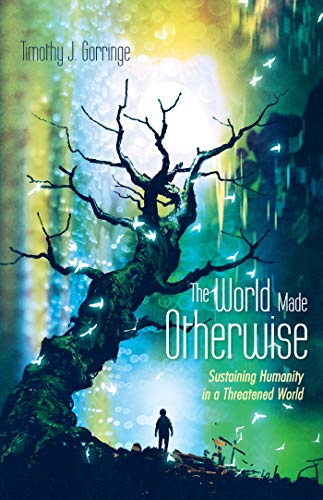Richard Godden: “The World Made Otherwise” by Timothy J. Gorringe

The sub-title of The World Made Otherwise is “Sustaining Humanity in a Threatened World” and climate change or other environmental issues form the book’s starting point and backdrop. Gorringe sees climate change as creating a burning platform that makes thorough-going political, economic and social change imperative.
His prognosis is dire. He opines that “civilisational collapse is likely” (page 19) and that, together, environmental issues and current socio-political trends “could suggest the ‘new dark ages’ of which MacIntyre spoke nearly 40 years ago” (page 153). He asserts that the resulting problems are primarily moral and political and that “neither technological fixes nor tweaking of the present economic system are sufficient to address them” (page 117). Instead, he thinks that the heart of the problem lies in false values.
Much of Gorringe’s discussion relating to values will be widely applauded: he rejects the post-modern relativism that reduces discussions of values to discussions of psychology or sociology, confusing values with either societal norms or preferences linked to self-realisation; he defends the idea of universal values against those who would deny their existence (including those on the left who suggest that the very idea of human rights is a form of Western cultural imperialism); he also rejects “the claim of the neoliberal market to provide the fundamental standard for everything whatsoever” (page 57) and instead seeks to establish a value system based on the ultimate end or object of human life, which he suggests is, in essence, the creative fulfilment of human potential, “a fulfilment that is both individual and social” (page 85).
His discussion of the problems within the existing political, economic and social order also contains much that will command wide acceptance, albeit not much that is new. In particular, the history of the twentieth century supports the wisdom of his call for “a critical watchfulness” with regards to our political practices and his warning that “all claims for absolute allegiance on the part of the state are idolatrous” (pages 133/134). Likewise, his warning about making an idol of the market will be accepted by all but the most extreme free marketeers and his criticisms of the workings of modern democracies (including the basis on which people cast their vote, the role of the media and lobbying) ring true.
Unfortunately, however, time and again Gorringe gravely overstates his case and, whilst some parts of the book are closely argued, much of what he asserts is not backed up by detailed analysis or engagement with different views. For example, he asserts that “equality must mean equality of outcome” (page 163) on the basis of five lines of argument and he makes no effort to comprehend the practical and moral arguments for the market economy or recognise the different conceptions of justice that underly much current socio-political debate (as to which, see Capitalism and Democracy by Thomas Spragens). Furthermore, the version of the market economy that he attacks is extreme and he fails to acknowledge that one can be in favour of a market economy yet at the same time recognise the need for guiding values outside it. Instead, he makes a number of unsupported ex cathedra assertions that, on occasions, descend into mere left-wing jibes (e.g. his side swipe at “austerity” measures, which he defines as “making sure the bankers do not have to pay for their mistakes”, page 198, and his distinction between “genuine science” and “the spurious corporate-financed variety”, page 290).
The least satisfactory part of the book is its suggestions for change: they are almost totally lacking in specificity and are absurdly Utopian. Gorringe says that he is putting forward what he calls “rights cosmopolitanism”, which he describes as “a vision of a cosmopolitan world of federated states where all people enjoy basic rights and freedoms simply in view of their humanity” (page 147). However, the vision is vague and Gorringe gives no clue as to how it might be realised. He envisages the break-up of current nation states and talks of “a world of small and devolved, but often federated states, where economic and environmental rules would be worked out together and held to be binding by the United Nations and its agencies” (page 152); he suggests that “local economies will have shorter supply chains and keep real wealth within the community” and that they “will not import products they can produce for themselves or export local products until local needs have been met”, citing apparently with approval, Molly Scott Cato’s suggestion that there might be perhaps 20 bioregions forming the basis for a reformed economy with each bioregion having “the task of provisioning its inhabitants” (pages 233/234); and he advocates monetary reform. Yet his political proposals amount to little more than a vague idea relating to the creation of local deliberative assemblies; leaving aside a few specific proposals (e.g. to mutualise utilities and provide a basic citizen’s income), his economic ideas are packed into a bewildering four page section in which he advocates the localisation of economic life; and, apart from discussing a few examples of what are, in essence, local or restricted use currencies, he gives us no clear idea of what monetary reforms he is seeking.
Gorringe defends himself against the charge of being Utopian by suggesting, first, “that nothing is so wildly Utopian as to try and build a sustainable world on the basis of greed and competition” and, secondly, that his proposals “are actually being modelled on the ground the world over” (page 236) but this defence fails. The first of these points has no bearing on the realism of his proposals and the second fails to recognise that the only examples he gives of anything remotely resembling the kind of localised system that he advocates are very small scale and, as he himself recognises, have many problems.
It is difficult to know precisely who the book is aimed at. It is not an academic work yet it is overloaded with quotations from and references to the views of different authors (e.g. the main text in the first five pages of the chapter relating to values includes references to the views of no less than 15 different authors). These come so thick and fast that parts of the book are heavy-going and they are likely to render it inaccessible to many potential readers. Furthermore, Gorringe is a liberal Christian who is heavily influenced by Marxist thinking and these starting points pervade The World Made Otherwise. Gorringe makes no attempt to justify them, with the result is that the book is unlikely to prove persuasive to those who do not share his assumptions. Thus, whilst most Christians will welcome his reminder that God ultimately owns all things (a fact which necessarily relativizes property rights), his approach to Scriptural interpretation will baffle and alarm many. For example, his suggestion that “The Eucharist (when not fetishized) adumbrates as a sign the view that the world is gifted to all creatures and is to be shared equally between them” (page 224) is, to put it mildly, difficult to extract from the biblical text, whilst his assertion that Hebrews 13:14 (“Here we have no abiding city”) “promises us that Rome (which for us is neoliberalism) will not last forever” (page 66) is extraordinary.
Gorringe has, for a long time, passionately believed in the need for radical, political, economic and social change and environmental issues have added to the imperative tone of his appeals for such change. However, passion and urgency do not of themselves make up a viable political programme. Gorringe’s theological villain is clearly St. Augustine of Hippo, who he feels is responsible for generations of Christians believing that “the possibility of a truly different society… belongs only to the next life” (page 67). On this basis, one might expect him to show us the way to an earthly paradise but, despite its title, The World Made Otherwise fails to provide one and, whatever one’s political views, Gorringe’s diagnosis and prognosis are simply depressing.
The World Made Otherwise by Timothy J. Gorringe was published in 2018 by Cascade Books (ISBN: 978-1-5326-4867-0). 348 pp
Richard Godden is a Lawyer and has been a Partner with Linklaters for over 25 years during which time he has advised on a wide range of transactions and issues in various parts of the world.
Richard’s experience includes his time as Secretary at the UK Takeover Panel and a secondment to Linklaters’ Hong Kong office. He also served as Global Head of Client Sectors, responsible for Linklaters’ industry sector groups, and was a member of the Global Executive Committee.

